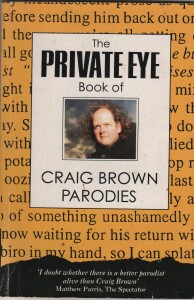 Around 2002 I was interviewing celebs on their book collection for Book and Magazine Collector while also researching the life of acclaimed poet and critic Geoffrey Grigson. One day I read an interview with the famous parodist Craig Brown, whose brilliant contributions to Private Eye had always had me in stitches. Judging from the interview, Brown’s library was dominated by biographies and especially memoirs of living figures in all fields, but with an emphasis on show biz. Interviewing him, I felt, would be a change from talking to rather dour politicians and academics on their first editions. And so it turned out.
Around 2002 I was interviewing celebs on their book collection for Book and Magazine Collector while also researching the life of acclaimed poet and critic Geoffrey Grigson. One day I read an interview with the famous parodist Craig Brown, whose brilliant contributions to Private Eye had always had me in stitches. Judging from the interview, Brown’s library was dominated by biographies and especially memoirs of living figures in all fields, but with an emphasis on show biz. Interviewing him, I felt, would be a change from talking to rather dour politicians and academics on their first editions. And so it turned out.
I discovered that at the time he lived in north Wilts, but when I saw the address I gasped. ‘Broad Town Farmhouse ‘,I read, open mouthed. He only lived in the house that Geoffrey Grigson had bought back in 1945 and where he had died forty years later. I knew that house; I had met Grigson on his death bed in October 1985, just a few weeks before he had died ( see earlier ‘ The Day I Met ‘ on Jane Grigson).
I seemed to remember that I got to Broad Town around midday by bus from Swindon. Brown greeted me and looked exactly like the photographs of him —a huge head atop a slim, slight frame. A fitting look for a mischievous gnome of a satirist. When we began to explore his collection he told me that it was not composed of rare tomes bound in leather, but was essentially a working library of mainly twentieth century books that he constantly turned to for inspiration when assembling his parodies. He revealed that his ‘ Diary ‘ pieces for Private Eyewere built around actual quotations from the memoirs of celebs to which he added his own parodic take on their writing style and the personalities they projected in the media. It was obviously a winning formula for such a topical magazine as Private Eye. Perhaps I should have asked him if he was also drawn to parodying authors from the past—literary figures especially—but somehow it seemed churlish to question whether he was equally adept at ridiculing Wordsworth or Dr Johnson.
Brown’s shelves certainly groaned with memoirs—of current novelist, poets, actors, footballers, TV stars and politicians—but he was also proud of his small collection of self-help books, including titles on cookery by celebs, and works on etiquette. He was particularly fond of a guide to proper conduct which provided advice on what to do if one of your dinner guests dropped dead at the table.
At our meeting I persuaded him to judge a parody contest I was planning to organise for the Alliance of Literary Societies. Nineteen years later that competition has still not come to fruition, but I have hopes. After the interview Brown showed me around Grigson’s garden, which was hardly recognisable as the one described in Gardenage (1952) or indeed the one that Jane had shown me back in 1985. But there was a plaque of some kind commemorating the couple’s association with the farmhouse. After a lunch of spag bol Brown with his wife drove me back to Swindon. The interview appeared a few weeks later.
